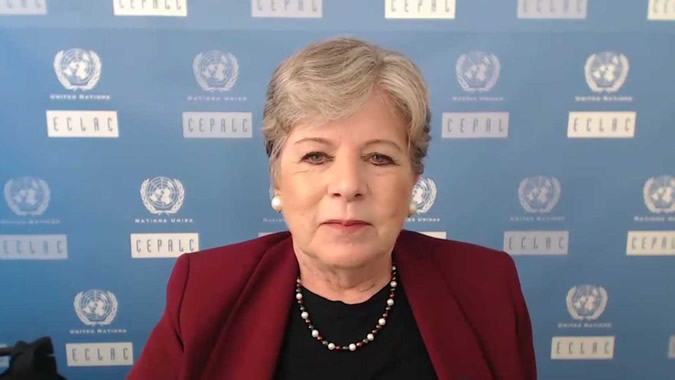Geospatial Information is Essential for Managing the Response to the Pandemic Because it Allows Vulnerability to be Determined Using a Disaggregated View of the Territory
Work area(s)
Alicia Bárcena, ECLAC’s Executive Secretary, gave a keynote address in the framework of the 7th Session of the UN-GGIM: Americas, where she stressed the importance of integrating statistical and geospatial information in the region.

The Executive Secretary of the Economic Commission for Latin America and the Caribbean (ECLAC), Alicia Bárcena, emphasized today that geospatial information is essential for managing the response to the pandemic prompted by the coronavirus (COVID-19), because it allows for vulnerability to be determined using a disaggregated view of the territory.
ECLAC’s most senior representative gave a keynote address today in the framework of the 7th Session of the Regional Committee of the United Nations on Global Geospatial Information Management for the Americas (UN-GGIM: Americas), which is being held virtually and was inaugurated by Stefan Schweinfest, Director of the United Nations Statistics Division, and moderated by Paloma Merodio, Vice President of the National Institute of Statistics and Geography (INEGI) of Mexico, in her capacity as President of UN-GGIM: Americas.
In her remarks, Alicia Bárcena warned that the crisis prompted by the pandemic has exposed the structural gaps, the culture of privilege and the asymmetries that characterize the region.
She recalled that in Latin America and the Caribbean, the crisis is intensifying: the worst contraction in 100 years is foreseen along with another lost decade. In addition, the crisis has been more intense than expected, it will last a longer time, and it will require active fiscal policies, she sustained.
She added that countries have limited resources, which is why geospatial information is crucial for identifying which areas in our territories have the greatest needs.
“In Caribbean countries, for example, we can clearly see the asymmetries in the impact of climate change, we can see what percentage of the population is living below 5 meters above sea level and is more vulnerable in terms of climate change,” she explained.
ECLAC’s Executive Secretary added that national efforts require greater international cooperation and stressed that coordination on the global and regional levels is urgently needed. Thus, she indicated, integrating statistical and geospatial information in the region is crucial.
“This is about creating partnerships and synergies between the regional communities that produce geospatial data, statistics and earth observations which are essential because, especially in the face of the COVID-19 pandemic, we need to territorialize,” she stated.
She underscored that the implementation of the UN-GGIM’s global guidelines at a national level will be essential for the geospatial response to COVID-19 and other crises to remain sustainable over time, and she stressed that geospatial information is a valuable tool for monitoring progress on compliance with the 2030 Agenda for Sustainable Development.
Alicia Bárcena noted that geospatial instruments are crucial for tracking COVID-19 because they establish the location of confirmed cases, the tests conducted, patients in intensive care and those who have died, broken down by sex and age; they provide demographic information on the population, education, housing, health infrastructure and economic characteristics; and they allow for monitoring the recovery through the location and statistical data associated with businesses, schools and workplaces.
She highlighted ECLAC’s creation of a COVID-19 Geoportal that has information enabling comparative analyses between countries and at a regional level, and of the COVID-19 Observatory, which compiles and makes available both the public policies that the 33 countries in the Latin American and Caribbean region are implementing to limit the pandemic’s impact, as well as analysis of the economic and social effects that these measures will have at a national and sectoral level.
In her presentation, ECLAC’s Executive Secretary recalled that the region will undergo a contraction of -9.1% in 2020, the worst in 100 years, and she warned that the collapse of tourism will hit Caribbean economies the hardest. Exports will fall -23% and poverty will end up affecting 230 million people (45 million more). Some 33 million people will slide into poverty from the middle strata, to the point where 8 out of every 10 people in the region (490 million) will need a basic income and universal policies. Inequality will reach 5% on average and unemployment will affect 44 million people. In addition, 2.7 million Micro, Small and Medium-sized Enterprises (MSMEs) are forecast to close.
She added that 40 million households are not connected to nor do they have access to good quality Internet, while 32 million children and adolescents cannot participate in distance learning.
Alicia Bárcena highlighted that ECLAC has proposed various measures to stimulate demand, based on a big push for the environment and sustainability, with digital infrastructure, greater investment in health, and by underpinning household consumption with a basic income for all people living in poverty – equivalent to one poverty line ($150 dollars per month) – to be complemented by an anti-hunger grant of around $47 dollars a month.
The regional commission also proposes a basic digital basket at an average cost of 1% of GDP, and expansionary fiscal and monetary policies to sustain a longer period of spending (which will be structural) with non-conventional instruments aimed mainly at helping the countries of the Caribbean and Central America.
ECLAC also proposes social and political compacts for universal, progressive and redistributive social protection, she concluded.
Type
Country(ies)
- Latin America and the Caribbean